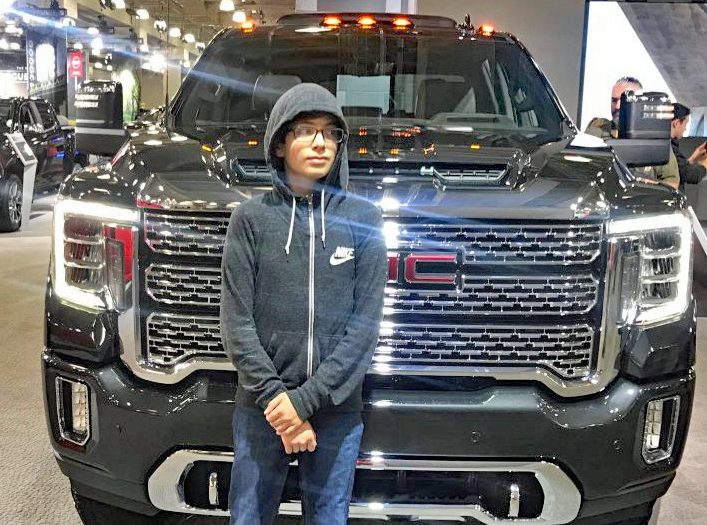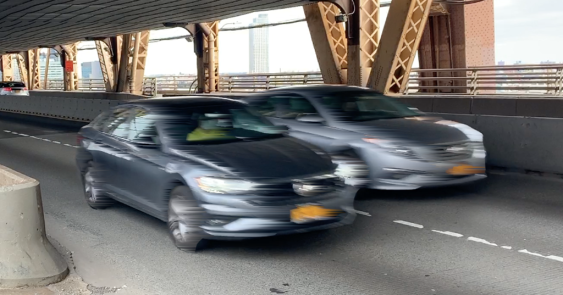The era of big government vehicle is over.
District of Columbia leaders, frustrated with the clouds of carbon dioxide emissions, chunks of asphalt dislodged from roadways, and preponderance of traffic deaths and injuries on city streets, voted this week to boost registration fees for the capital city's largest, barely street-legal SUVs.
"We know that, the larger a vehicle, the worse it is for the environment, the more damage it causes to our roads, and the more dangerous to others using the roadway — that is, larger vehicles are significantly more likely to result in death or serious injury when in a crash,” D.C. Council Transportation Committee Chairwoman Mary Cheh, who wrote the proposal, told Streetsblog.
Owners holding onto their mammoth-sized machines that weigh more than 6,000 pounds will now fork over $500 to keep their Brobdingnagian behemoths in the district, up from $155 and roughly seven times the registration cost of a normal sedan. Motorists whose gigantic gas guzzlers weigh in between 5,000 and 6,000 pounds will shell out $250 per year (also up from $155), while heavy hoopties that merely weigh between 3,500 and 5,000 pounds will hand over $175 per year, up from the $115 they currently pay. Before the change, owners of the heaviest cars paid only double — $115 vs. $72 — what owners of the lightest cars paid.
The new fee scale could raise an estimated $40 million in revenue over the next five years, which could go toward street safety initiatives and infrastructure near schools, including better crossings, curb extensions, speed bumps, new signage, and pick-up and drop-off zones, city officials said.
Much of the windfall will go toward fixing dilapidated roads that have cracked under the weight of pickup trucks and full-size SUVs. The city shoveled $40 million into road repair in the 2020 and 2021 fiscal years, after spending only $5 million to fix roads 15 years ago, officials said.
Cheh acknowledged that the registration hike may not convince drivers to abandon their fraught four-by-fours but the district needed to pay for the rising expense of road maintenance and redesign.
“This is an attempt to recognize the additional harms caused by larger vehicles — drivers who pick these larger vehicles will now need to pay a bit more to compensate for that additional damage,” Cheh said. “I have no illusions that this policy will be a panacea for traffic violence in the District, but it is a step forward, and a way to recoup some of the costs to society from these oversized vehicles.”
Sales of SUVs have continued to outpace sedans leading up to the pandemic, but the presence of more of these vehicles on the roads is almost certainly a factor in the rise in traffic deaths nationwide.
An estimated 42,915 people were killed in traffic crashes in 2021, up 10.5 percent from the previous year and the highest since 2005, according to National Highway Traffic Safety Administration data. Sports utility vehicles are three times more likely to kill a pedestrian than a sedan and four times as likely to kill a child while moving, an NHTSA assessment showed.
The numbers are skyrocketing despite the efforts of Vision Zero policies aimed at eliminating traffic fatalities entirely. The number of traffic deaths in Washington D.C. has continued to rise each year for the past three years, from 27 in 2019, 37 in 2020, and 40 last year. There have been 15 deaths already this year and 1,131 crashes that involved injuries, according to D.C. Vision Zero records.
In New York, 88 people have been killed in traffic crashes so far this year, a 35-percent increase over the same period four years ago. Meanwhile, SUV ownership in the five boroughs has risen 21 percent between 2016 and 2020 with more than 200,000 vehicles barreling through city roadways. A 1-year-old girl was killed by the driver of a large Jeep on Thursday, prompting more outrage against the assault cars.
“As more oversized SUVs and light trucks proliferate on our streets, we are seeing a crisis of pedestrian death,” said Danny Harris, executive director of Transportation Alternatives. "These giant vehicles bring more weight, more power, a higher likelihood of a head or chest impact, and extremely limited visibility, and as a result, a much higher rate of pedestrian death.”
Washington is one of the few cities to spotlight the dangerousness of large vehicles and shame its owners. Advocates say that more regulation is a step in the right direction toward changing driving habits and consumer behavior over the long run.
“It's asking drivers to pay a slightly higher fraction of the costs that their driving choices, specifically their choice of vehicle, imposes on everyone else,” said Caitlin Rogger, executive director, D.C. Sustainable Transportation Coalition. “Price points are a major part of how consumers make decisions, so getting drivers to pay a bit more of the fair share of the costs of their vehicle choices has the potential to change some of those decisions to more socially-optimal ones. In other words to get consumers to choose cars that are less likely to hurt, kill or sicken people.”





